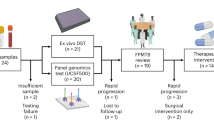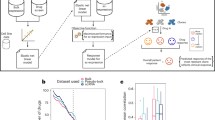Abstract
We analyzed associations between CXCR4/CXCL12 single-nucleotide polymorphisms and outcomes in metastatic colorectal cancer (mCRC) patients who underwent first-line bevacizumab-based chemotherapy. A total of 874 patients were included in this study: 144 treated with bevacizumab and FOLFOX or XELOX (training cohort), 653 treated with bevacizumab and FOLFIRI or FOLFOXIRI (validation cohort A or B) and 77 treated with cetuximab- and oxaliplatin-based regimens (control cohort). One CXCR4 polymorphism (rs2228014) and two CXCL12 polymorphisms (rs1801157 and rs3740085) were analyzed by PCR-based direct sequencing. Patients with a C/C genotype had a prolonged progression-free survival (PFS) compared with those with any T allele (P=0.030) in the training cohort. Similarly, patients with the C/C genotype had a superior PFS in the validation cohorts, but not in the control cohort. Our findings suggest that a common genetic variant, CXCR4 rs2228014, could predict PFS and may guide therapeutic decisions in mCRC patients receiving first-line bevacizumab-based chemotherapy.
This is a preview of subscription content, access via your institution
Access options
Subscribe to this journal
Receive 6 print issues and online access
$259.00 per year
only $43.17 per issue
Buy this article
- Purchase on Springer Link
- Instant access to full article PDF
Prices may be subject to local taxes which are calculated during checkout


Similar content being viewed by others
References
Zlotnik A . Chemokines and cancer. Int J Cancer 2006; 119: 2026–2029.
Burger JA, Kipps TJ . CXCR4: a key receptor in the crosstalk between tumor cells and their microenvironment. Blood 2006; 107: 1761–1767.
Kucia M, Reca R, Miekus K, Wanzeck J, Wojakowski W, Janowska-Wieczorek A et al. Trafficking of normal stem cells and metastasis of cancer stem cells involve similar mechanisms: pivotal role of the SDF-1-CXCR4 axis. Stem Cells 2005; 23: 879–894.
Zou YR, Kottmann AH, Kuroda M, Taniuchi I, Littman DR . Function of the chemokine receptor CXCR4 in haematopoiesis and in cerebellar development. Nature 1998; 393: 595–599.
Salvucci O, Yao L, Villalba S, Sajewicz A, Pittaluga S, Tosato G . Regulation of endothelial cell branching morphogenesis by endogenous chemokine stromal-derived factor-1. Blood 2002; 99: 2703–2711.
Guleng B, Tateishi K, Ohta M, Kanai F, Jazag A, Ijichi H et al. Blockade of the stromal cell-derived factor-1/CXCR4 axis attenuates in vivo tumor growth by inhibiting angiogenesis in a vascular endothelial growth factor-independent manner. Cancer Res 2005; 65: 5864–5871.
Kim J, Mori T, Chen SL, Amersi FF, Martinez SR, Kuo C et al. Chemokine receptor CXCR4 expression in patients with melanoma and colorectal cancer liver metastases and the association with disease outcome. Ann Surg 2006; 244: 113–120.
Schimanski CC, Schwald S, Simiantonaki N, Jayasinghe C, Gonner U, Wilsberg V et al. Effect of chemokine receptors CXCR4 and CCR7 on the metastatic behavior of human colorectal cancer. Clin Cancer Res 2005; 11: 1743–1750.
Mrowicki J, Przybylowska-Sygut K, Dziki L, Sygut A, Chojnacki J, Dziki A et al. The role of polymorphisms of genes CXCL12/CXCR4 and MIF in the risk development IBD the Polish population. Mol Biol Rep 2014; 41: 4639–4652.
Loupakis F, Cremolini C, Masi G, Lonardi S, Zagonel V, Salvatore L et al. Initial therapy with FOLFOXIRI and bevacizumab for metastatic colorectal cancer. N Engl J Med 2014; 371: 1609–1618.
Tsuji A, Nakamura M, Sunakawa Y, Kochi M, Denda T, Yamaguchi T et al. A phase II study of cetuximab and mFOLFOX6 in mCRC including prospective early tumor shrinkage analysis (JACCRO-CC05). 2013 Ann Oncol 24: iv38–iv121.
Tsuji A, Sunakawa Y, Denda T, Takinishi Y, Kotaka M, Tanioka H et al. A phase I/II study of cetuximab (cet) in combination with S–1 and oxaliplatin (SOX) in first-line treatment for metastatic colorectal cancer (mCRC) (JACCRO CC-06). J Clin Oncol 2014; 32 (Suppl 3): abstract 571.
Loupakis F, Yang D, Yau L, Feng S, Cremolini C, Zhang W et al. Primary tumor location as a prognostic factor in metastatic colorectal cancer. J Natl Cancer Inst 2015; 107, dju427.
Dwinell MB, Ogawa H, Barrett KE, Kagnoff MF . SDF-1/CXCL12 regulates cAMP production and ion transport in intestinal epithelial cells via CXCR4. Am J Physiol Gastrointest Liver Physiol 2004; 286: G844–G850.
Cai C, Wang LH, Dong Q, Wu ZJ, Li MY, Sun YH . Association of CXCL12 and CXCR4 gene polymorphisms with the susceptibility and prognosis of renal cell carcinoma. Tissue Antigens 2013; 82: 165–170.
Kucukgergin C, Isman FK, Dasdemir S, Cakmakoglu B, Sanli O, Gokkusu C et al. The role of chemokine and chemokine receptor gene variants on the susceptibility and clinicopathological characteristics of bladder cancer. Gene 2012; 511: 7–11.
Teng YH, Liu TH, Tseng HC, Chung TT, Yeh CM, Li YC et al. Contribution of genetic polymorphisms of stromal cell-derived factor-1 and its receptor, CXCR4, to the susceptibility and clinicopathologic development of oral cancer. Head Neck 2009; 31: 1282–1288.
Oskarsson T, Batlle E, Massague J . Metastatic stem cells: sources, niches, and vital pathways. Cell Stem Cell 2014; 14: 306–321.
Schioppa T, Uranchimeg B, Saccani A, Biswas SK, Doni A, Rapisarda A et al. Regulation of the chemokine receptor CXCR4 by hypoxia. J Exp Med 2003; 198: 1391–1402.
Staller P, Sulitkova J, Lisztwan J, Moch H, Oakeley EJ, Krek W . Chemokine receptor CXCR4 downregulated by von Hippel-Lindau tumour suppressor pVHL. Nature 2003; 425: 307–311.
Fransen K, Fenech M, Fredrikson M, Dabrosin C, Soderkvist P . Association between ulcerative growth and hypoxia inducible factor-1alpha polymorphisms in colorectal cancer patients. Mol Carcinog 2006; 45: 833–840.
Gerger A, El-Khoueiry A, Zhang W, Yang D, Singh H, Bohanes P et al. Pharmacogenetic angiogenesis profiling for first-line Bevacizumab plus oxaliplatin-based chemotherapy in patients with metastatic colorectal cancer. Clin Cancer Res 2011; 17: 5783–5792.
Xu L, Duda DG, di Tomaso E, Ancukiewicz M, Chung DC, Lauwers GY et al. Direct evidence that bevacizumab, an anti-VEGF antibody, up-regulates SDF1alpha, CXCR4, CXCL6, and neuropilin 1 in tumors from patients with rectal cancer. Cancer Res 2009; 69: 7905–7910.
Matsusaka S, Mishima Y, Suenaga M, Terui Y, Kuniyoshi R, Mizunuma N et al. Circulating endothelial progenitors and CXCR4-positive circulating endothelial cells are predictive markers for bevacizumab. Cancer 2011; 117: 4026–4032.
Federsppiel B, Melhado IG, Duncan AM, Delaney A, Schappert K, Clark-Lewis I et al. Molecular cloning of the cDNA and chromosomal localization of the gene for a putative seven-transmembrane segment (7-TMS) receptor isolated from human spleen. Genomics 1993; 16: 707–712.
Petersen DC, Glashoff RH, Shrestha S, Bergeron J, Laten A, Gold B et al. Risk for HIV-1 infection associated with a common CXCL12 (SDF1) polymorphism and CXCR4 variation in an African population. J Acquir Immune Defic Syndr 2005; 40: 521–526.
Okuyama Kishima M, Brajão de Oliveira K, Ariza CB, de Oliveira CE, Losi Guembarovski R, Banin Hirata BK et al. Genetic polymorphism and expression of CXCR4 in breast cancer. Anal Cell Pathol (Amst) 2015 2015: 289510.
Cancer Genome Atlas Network. Comprehensive molecular characterization of human colon and rectal cancer. Nature 2012; 487: 330–337.
Mitchell B, Leone D, Feller JK, Bondzie P, Yang S, Park HY et al. Correlation of chemokine receptor CXCR4 mRNA in primary cutaneous melanoma with established histopathologic prognosticators and the BRAF status. Melanoma Res 2014; 24: 621–625.
Torregrossa L, Giannini R, Borrelli N, Sensi E, Melillo RM, Leocata P et al. CXCR4 expression correlates with the degree of tumor infiltration and BRAF status in papillary thyroid carcinomas. Mod Pathol 2012; 25: 46–55.
Thomaidis T, Maderer A, Al-Batran SE, Kany J, Pauligk C, Steinmetz K et al. VEGFR-3 and CXCR4 as predictive markers for treatment with fluorouracil, leucovorin plus either oxaliplatin or cisplatin in patients with advanced esophagogastric cancer: a comparative study of the Arbeitsgemeinschaft Internistische Onkologie (AIO). BMC Cancer 2014; 14: 476.
Acknowledgements
S Matsusaka is a recipient of Takashi Tsuruo Memorial Fund. MD Berger received a grant from the Swiss Cancer League (BIL KLS-3334-02-2014). S Stremitzer is a recipient of an Erwin Schrödinger fellowship of the Austrian Science Fund (J3501-B13). This study was partly funded by NIH Grant P30CA14089-27S1 and Yvonne Bogdanovich. The content is solely the responsibility of the authors and does not necessarily represent the official views of the National Cancer Institute or the National Institutes of Health.
Author information
Authors and Affiliations
Corresponding author
Ethics declarations
Competing interests
The authors declare no conflict of interest.
Additional information
Supplementary Information accompanies the paper on the The Pharmacogenomics Journal website
PowerPoint slides
Rights and permissions
About this article
Cite this article
Matsusaka, S., Cao, S., Hanna, D. et al. CXCR4 polymorphism predicts progression-free survival in metastatic colorectal cancer patients treated with first-line bevacizumab-based chemotherapy. Pharmacogenomics J 17, 543–550 (2017). https://doi.org/10.1038/tpj.2016.59
Received:
Revised:
Accepted:
Published:
Issue Date:
DOI: https://doi.org/10.1038/tpj.2016.59



